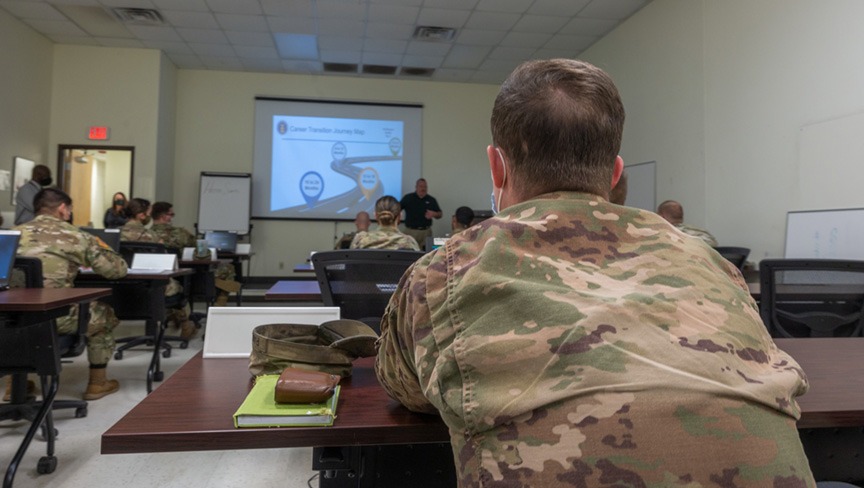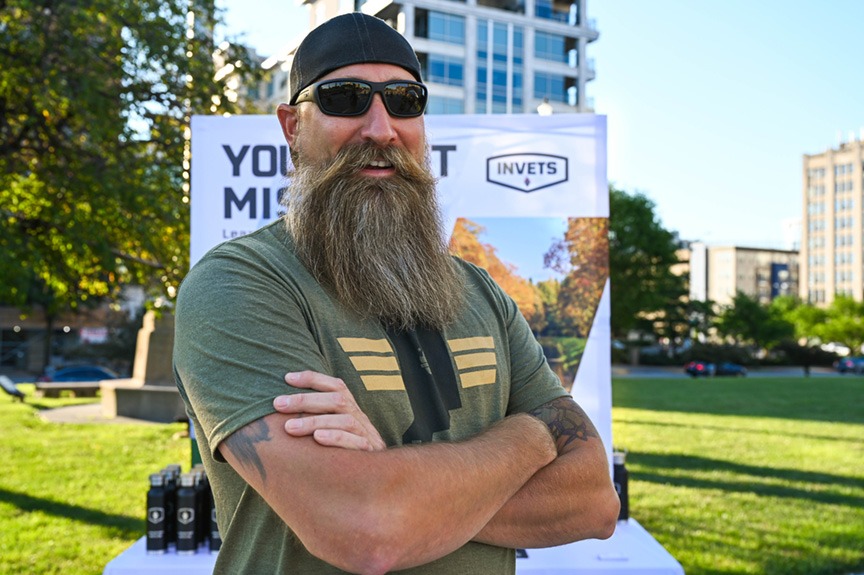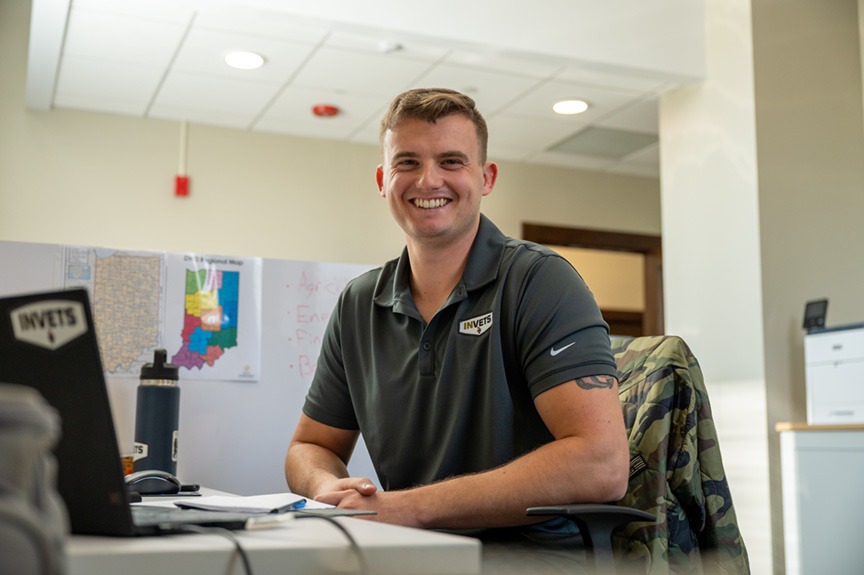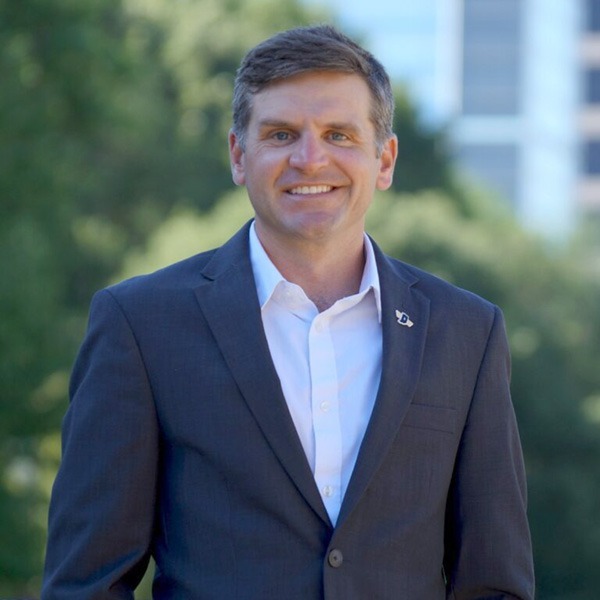Blaine is a seasoned veteran who spent six years on Active Duty as an Infantryman in the U.S. Army—with deployments to both Iraq and Afghanistan. After his Active Duty tour, he immediately joined the Indiana National Guard, where he still serves as an Infantry Officer. Blaine joined INvets in 2020 as the Director of Veteran Engagement and was eventually named President & CEO of the organization in January 2022.
A Veteran’s Perspective: Transitioning to Life in Indy

Photo courtesy of INvets
Indiana prides itself on being a very veteran-friendly state. In fact, Indianapolis has more acreage dedicated to honoring veterans than any other city, as well as the second highest number of memorials in the country—second only to Washington D.C. But what exactly does it mean to be “veteran-friendly?”
Is it about monuments and memorials? Or is it about legislative action for veterans, such as tax-free military retirement pay? Does “veteran-friendly” mean free lunches and murmurs of “thank you for your service” on Veterans Day? Or does it look like commemorative banners on street lights, honoring the servicemembers in your community?
Well, the truth is that it’s a combination of all those things—but supporting veterans is about more than just their veteran status. It’s about helping them transition and connect with their community.
One of the main issues for veterans is adjusting to civilian life after service. Each year, roughly 200,000 veterans separate from military service due to retirement, medical discharges, end of service contracts, and other reasons. But where do these veterans go next?
According to the Department of Defense, approximately 27% of servicemembers will return home. Another 23% will stay at their last duty station, but the majority (49%) are willing to relocate wherever “the best opportunity is.”
For many, that destination is Indiana. Indiana is one of the top states that veterans choose to relocate to after service, averaging over 5,000 new residents annually. So, what truly makes Indiana a veteran-friendly state?
Support for veterans needs to be transformational—not just transactional.
When communities think about veterans transitioning into the civilian workforce, they often consider three main areas: job placement, VA benefits, and mental health. Folks typically think of these issues as very transactional moves. Basically, they say: “We’ll help you land a job. Here’s the number to Veterans Affairs, and our local American Legion is just down the road. Good luck!” Rarely, if ever, do states blend these areas into one solution.
The problem with this approach is that transitioning to civilian life is not transactional. It’s transformational! This is the next chapter for veterans and their families. They’ve already moved all over the country, possibly traveled the world, and experienced life through a lens most can’t even imagine.
Of course, veterans want a great career that can provide for their families. But they also want to feel like they’re part of something greater than themselves. They seek camaraderie, purpose, and fulfillment. Yes, helping veterans find jobs and resources is a good jumping off point. But are you purposefully integrating veterans into your community? Being “veteran-friendly” is about making an effort to connect with veterans and help them find a place to belong.

Photo courtesy of INvets
Veterans need jobs that help them reconnect with their community.
On the employment front, companies need to understand what type of employee they’re getting with a veteran, while effectively making them feel welcome and involved in the organization.
Military service translates into a variety of soft skills that are important for the civilian workforce. Recognizing these skills helps ensure that veteran employees feel like valued members of the team, and working toward a shared goal is going to go a long way in terms of overall productivity and employee retention.
After all, being a veteran isn’t a personality trait—and it shouldn’t just be a diversity, equity, and inclusion box for companies to check. These men and women are leaving one profession and moving into another, and that transition can often feel extremely daunting. Just like anyone else, these transitioning servicemembers want to find a place to call home—a place where they truly feel welcome.
If you only help veterans find jobs, then you aren’t really solving the core issue with reintegration into civilian society: the giant culture shock.
While in the service, veterans are told where to be, when to be there, and even what to wear. They have a clear path through their career, knowing exactly what it takes to earn their next promotion.
In the civilian world, things are never that black and white. Transitioning veterans are cut off from the close-knit circle of their unit, and they’re left with countless micro-decisions to make throughout the day—decisions they didn’t even realize they were making before. As an employer, companies must be aware and understanding of this reality if they want to help veterans adjust to the culture shock.
Indianapolis has many organizations that advocate for veterans.
On the community front, Indiana—and specifically the Indy region—are at the forefront of veteran integration. Our community is constantly trying new approaches to help veterans seamlessly transition to their civilian life.
Cities like Fishers and Noblesville are working on a new “welcoming committee” to help introduce veteran residents to their new community. These committees will guide veterans around the city, help them understand the local school systems, and show them how to get more involved. After all, it’s important for transitioning servicemembers to learn about their community as a whole—not just the existing veterans groups.
This approach is very similar to the military’s Total Army Sponsorship Program–or TASP, where servicemembers are assigned sponsors to help them transition to a new duty location. These sponsors help show them the ropes and make it easier to integrate into the community.
Central Indiana has many similar organizations that exist to make the transition back to civilian life easier on servicemembers and their families. While many veterans are already aware of Veterans Affairs, I strongly encourage every transitioning servicemember to look into their VA benefits. People often don’t realize what benefits they qualify for, but that’s why Indiana’s Department of Veterans Affairs offers helpful resources and opportunities all across the state.
Indiana also creates opportunities for veterans to get involved with volunteerism, athletics, and other communal activities. Organizations like Team Red, White, and Blue have chapters across the United States, helping veterans bond through exercise. You can often see them running around the Indy region, wearing eagle shirts and proudly racing with an American Flag.
Another organization—Team Rubicon—mobilizes veterans to volunteer in disaster relief efforts across the country. Hundreds of Hoosier veterans have already joined the cause, volunteering to help people like the Afghan refugees at Camp Atterbury. Meanwhile, the Indy Warrior Partnership helps connect veterans with any help they need, serving as a local network for all veteran services in the region.

Photo courtesy of INvets
INvets is dedicated to helping veterans successfully transition here in Indiana.
In 2020, INvets was created as a 501(c)3 public-private partnership with the Lieutenant Governor’s office to attract, recruit, and retain veterans in the State of Indiana. We partner with over 450 companies all over the state to help veterans and their spouses get their foot in the door.
If a veteran or their spouse applies for a job through INvets, the hiring manager will also receive a direct message from our team, giving candidates additional exposure in the applicant tracking system. We also partner with great organizations like Operation Job Ready Vets to help with resume writing and interview skills.
Originally, we were a workforce development organization, solely focused on helping veterans find careers in Indiana. But we’ve recently evolved our services to be more transformational, ensuring that we’re addressing the complete picture of the transition process.
Now, INvets travels to Active-Duty bases all over the country to recruit veterans to the Hoosier State, helping them find the right community and career to fit their lifestyle. We also partner with the Indiana Destination Development Corporation to showcase why Indiana is a great place to live and raise a family. By taking this approach, we believe we can make a more meaningful impact on transitioning veterans and their families.
Indiana is a place that makes veterans feel like valued citizens.
Here in Indiana, we try to proactively help veteran families, so they can make the best, most educated decision on where to put down roots. This proactive approach also helps combat mental health issues early on, instead of waiting for calls from veterans who feel like they don’t belong. Hopefully, by helping someone get on the right track early in their transition, it will lower the chances of mental health pitfalls in the future.
At INvets, we believe this mission is important not just for veterans, but also our local communities. We take the time to understand each community’s distinct character and values, so we can better pair veterans with a place they’ll feel at home.
This makes the relocation process easier, while attracting new, “MVP-caliber” residents to our communities. Veterans bring a whole new perspective to the community, offering practical solutions to everyday problems. They’re also more likely to get involved in local school systems, volunteer in the community, and—of course—vote!
With these new efforts, I’m proud to say that Indiana has truly become a more veteran-friendly state. It’s important for more communities to follow in Indiana’s footsteps and understand that veteran recognition isn’t the same as integration.
After all, veterans aren’t looking for someone to give them a handout. They want to feel involved and active in both their communities and their companies. INvets approaches this piece of the puzzle with pride, and we look forward to helping Indiana become the best state for veterans to live post-service.
If you’re an employer or community leader who’d like to learn more about welcoming veterans as they leave the service, I’d love to chat with you about it. Check out our website at www.invets.org or you can reach me personally at blaine@invets.org.


